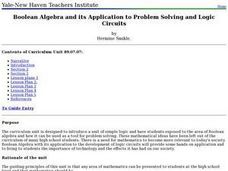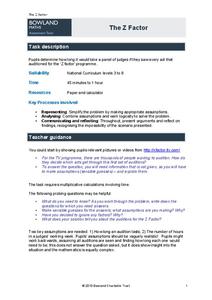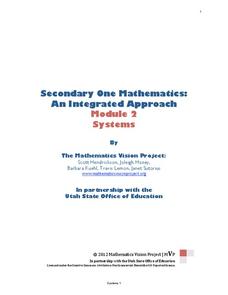Curated OER
Boolean Algebra and its Application to Problem Solving and Logic Circuits
Introduce learners to the concept of Boolean Algebra. In groups, they are given real life situations in statements and make conclusions. They will use the statements to form compound statements. To end the lesson, they use the compound...
EngageNY
Applications of Systems of Equations and Inequalities
Is the application of systems of equations giving your class headaches? Use this resource to build on your pupils' logic to lead them to building equations and using algebraic methods. The instructional activity begins with an...
Curated OER
Math, Fractions, and Music
Students discover the relationship between musical rhythms and fractions. They add musical notes together to produce fractions and create addition and subtraction problems with musical notes. Students complete worksheets and create their...
Noyce Foundation
On Balance
Investigate the world of unknown quantities with a creative set of five lessons that provides problem situations for varying grade levels. Each problem presents a scenario of fruit with different weights and a balance scale. Using the...
Noyce Foundation
Digging Dinosaurs
Build a function to solve problems rooted in archeology. A comprehensive set of five lessons presents problems requiring individuals to use functions. The initial lesson asks learners to find the possible number of dinosaurs from a...
Noyce Foundation
The Shape of Things
Investigate the attributes of polygons. A thorough set of lessons presents problem scenarios for elementary through high school classes. The first lessons focus on basic characteristics of polygons, including the line of symmetry. As the...
Noyce Foundation
First Rate
Explore distance and time factors to build an understanding of rates. A comprehensive set of problems target learners of all grade levels. The initial problem provides distance and time values and asks for the winner of a race. Another...
Noyce Foundation
Tri-Triangles
Develop an understanding of algebraic sequences through an exploration of patterns. Five leveled problems target grade levels from elementary through high school. Each problem asks young mathematicians to recognize a geometric pattern....
Noyce Foundation
Diminishing Return
Challenge individuals to compete as many tasks as possible. Lower-level tasks have pupils apply costs and rates to solve problems. Upper-level tasks add algebraic reasoning and conditional probability to the tasks.
ABCya
A Blocky Christmas!!
And you thought holiday shopping was tough! A fun Christmas game prompts players to direct a star block into position with the arrow keys on their keyboard. As they progress through levels, they use the star block to move additional...
Curated OER
Yummy Math
Young mathematicians use bags of Skittles to help them gain practice in graphing and organizing data. They work in pairs, and after they have counted and organized their Skittles, they access a computer program which allows them to print...
Illustrative Mathematics
Sum of Angles in a Polygon
How can learners use algebra to solve a geometry problem? Help learners create an equation that shows the relationship between the number of sides of a polygon and the sum of the interior angles. Students are asked to divide the...
Curated OER
Logical Problem Solving
In this logical problem solving worksheet, 7th graders solve and complete 4 different types of problems. First, they fill in the boxes for each balance problem. Then, students state whether each statement given is true or false and give...
Curated OER
Missing Hundred Square
Kids are presented with the problem of finding the missing numbers to each of nine 100s squares. They'll need to subtract and add to make each puzzle equal 100. Great challenge or daily warm-up activity.
California Education Partners
Improving Our Schools
Split the work three ways. Learners use their knowledge of fractions to solve problems dealing with splitting up work loads evenly between three groups. Scholars determine the fractional portion of work each group will do along with...
Bowland
The Z Factor
Young mathematicians determine the number of hours it would take judges of the "Z Factor" television talent show to watch every act. Participants make estimates and assumptions to solve the problem.
Teach Engineering
Solving Energy Problems
Here's your chance to save the world. The eighth lesson in a 25-part Energy Systems and Solutions unit has young scientists come up with ideas for individual or group projects. They identify ways to solve the energy crisis. Hope they...
Curated OER
Probability Crossword
Make probability fun and test your learners' knowledge of math probability vocabulary. Print out this crossword puzzle and see if they know enough about outcomes and experiments to fill in the blanks. The answer key is attached in...
EngageNY
Graphing Quadratic Functions from Factored Form
How do you graph a quadratic function efficiently? Explore graphing quadratic functions by writing in intercept form with a lesson that makes a strong connection to the symmetry of the graph and its key features before individuals write...
American Statistical Association
Happy Birthday to . . . Two?
How many people do you need in a room before two likely share the same birthday? Scholars consider this puzzle by analyzing a set of data. They ponder how to divide the data and determine the proper size of a group for this event to...
Bowland
Fish Dish
Minimize the time it takes to create a fish dish. Scholars use their knowledge of time to devise an order that accounts for different constraints. Considering jobs that can be done in parallel is essential to solving the problem.
Mathematics Vision Project
Module 2: Systems of Equations and Inequalities
The brother-sister pair Carlos and Clarita need your class's help in developing their new pet sitting business. Through a variety of scenarios and concerns presented to the siblings, the learners thoroughly explore systems of equations...
EngageNY
Construct an Equilateral Triangle (part 1)
Drawing circles isn't the only thing compasses are good for. In this first installment of a 36-part series, high schoolers learn how to draw equilateral triangles by investigating real-world situations, such as finding the location of a...
Curated OER
Have Block Party!
Students discover that the possibilities are limitless in this block-building activity. In this early childhood, problem solving lesson, students develop social, problem-solving, math, and language skills using a specific number of...

























